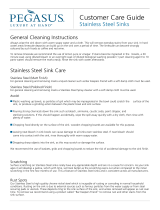
R
Have a question or need assistance?
support@ticorsinks.com
www.ticorsinks.com
Superficial rusting & staining
preventing/healing Scratches
Stainless steel does not rust, and Ticor sinks are no exception. However, you may notice
that it is possible for supercial rust to accumulate on the surface of the sink. This can
occur when iron particles from other items bond to the sink.
Do not allow metal items such as dishware, scouring pads, or tools to be left in the sink
for extended periods.
If you do notice rust spots, use Bar Keepers Friend™ and a soft scouring pad (e.g.,
Scotch-Brite™) and scrub gently in the direction of the grain to remove the rust.
Leaving a wet sponge, standing water, or staining foods such as coee or red wine in
the sink basin can cause supercial staining or mineral deposits. Stains can be removed
by soaking in a gentle biological detergent, and mineral deposits can be cleaned with a
solution of vinegar and water.
Never use metal scouring pads, harsh abrasive cleaners, or bleach in your sink.
Always scrub in the direction of the grain, not perpendicularly or in a circular motion.
Scratches are unavoidable in any sink, including stainless steel sinks.
Prevent scratches by using the custom t basin rack. This will help protect your sink
from damage from dropped items, sharp or hard items, and also from grit that may
cause scratches when trapped between at dishwares and the sink surface.
Over time, scratches blend into the grain of the sink. You can also remove scratches
by using Bar Keepers Friend™, water, and a soft scouring pad (e.g., Scotch-Brite™)
and scrub gently in the direction of the grain until the scratch is no longer visible. Use
long strokes, not just a small area, in order to ensure the grain remains consistent in
appearance.
Never drop sharp or heavy items into your sink. Take care when handling items made
of stone, diamond, glass, ceramic, or abrasives as they can scratch the sink.
Do not use your sink as a cutting board.
Cover the sink surface during construction to ensure that tools, paint, chemicals, and
cleaners do not come into contact with the sink surface. These can cause permanent
damage or discoloration.
Immediately remove any excess silicone or adhesive used to install the sink.
installation & remodeling






